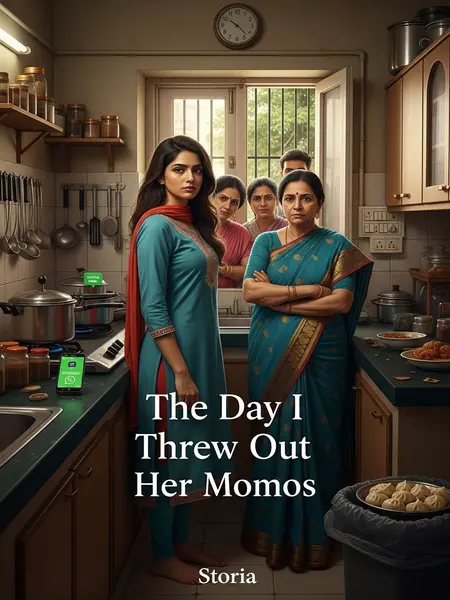Chapter 1: The Momos Incident
Mother-in-law made a huge batch of momos and stacked them in the fridge, each layer dusted with flour so they wouldn’t stick—so typical, that perfectionist streak in every Sharma family member. Every time I opened the freezer, the sharp, homely mix of ginger and garlic hit me, clinging to my hands even after I closed the door. In my head, I could almost hear her muttering, “Neha will love this. Bahu ko khush rakhna hai, after all.”
The moment she left the house, I dumped all the momos into the dustbin.
I didn’t even pause to think—just yanked the cold tray out and tipped everything in. The momos landed in the metal bin with a dull thud, some bouncing, others splitting open. I didn’t care. I covered them up with yesterday’s potato peels and onion skins, then slammed the lid shut. My heart fluttered nervously, but mixed in was a weird relief—finally, some space in that always-overstuffed freezer.
But fate had other plans. She came back early and caught me red-handed.
Just my luck. I froze, one foot in the kitchen, a potato peel stuck to my slipper. She stood in the doorway, shopping bag dangling, her eyes huge with disbelief. For a second, no one said a word. Only the distant whistle of a neighbour’s pressure cooker filled the silence between us.
She whipped out her phone, started recording, and posted the video to the family WhatsApp group, sobbing and wailing: "The momos I made for my bahu—she threw them all away! Why does she hate me so much?"
She didn’t let up. With that shrill, trembling voice only Indian mothers-in-law can perfect, she sniffled into her phone, glancing at me for effect. Her hands shook, gold bangles jangling, the performance complete. "My hands are aching, but my heart aches even more. Dekho, family, Neha ka kiya!" Seconds later, the Sharma Parivaar WhatsApp group was pinging nonstop.
Soon enough, the whole family descended on our flat to scold me.
It felt like the entire mohalla had been summoned. Slippers shuffled in the corridor, someone was arguing with the security guard about visitor passes, and suddenly our little flat felt stifling—too many bodies, too much tension. A plastic bag of guavas landed on the shoe rack, and a child’s wail echoed outside.
I cooked all the momos and served each person a bowl.
My hands shook as I lifted the pressure cooker lid. The kitchen was a sauna—the clang of steel plates, the hiss of the cooker, and the sticky heat made me feel like I was boiling along with the momos. My dupatta kept slipping off my shoulder, but I carried on. What choice did I have? I lined up the bowls, the watery chutney looking more suspicious than usual.
As they started eating, their faces changed in an instant.
First surprise, then confusion, then everyone’s face crumpled in disgust. Rajeev, the eldest, tried to hide it, but even he grimaced. The air felt thick, and for a while, only the ticking wall clock and the static from the TV in the next room—*Anupamaa* still blaring—broke the heavy silence.
When I saw my mother-in-law’s video in the group chat, I knew today was going to be a battlefield.
Her voice rang out in the group, and my phone wouldn’t stop buzzing. That familiar dread weighed down on me—like pre-monsoon humidity before a storm. I could imagine all the chachis and buas gossiping, forwarding the video: “Arrey, did you see what Neha did?”
Regret gnawed at me. I should have waited till night, when everything was quiet, and dumped them straight into the society’s dustbin. Every Indian daughter-in-law knows—if you want to throw something away, you do it after the colony lights go off and the guard’s dozing on his plastic chair. But no, my big city confidence had to get me caught.
After her dramatic video, she grabbed the ruined momos and marched to the kitchen.
She swept past me with that look—a mix of disappointment and wounded pride. Her heavy anklets clinked as she went, more drama queen than matriarch.
I brought out the fridge container, watching as she put the momos back in.
My heart hammered. My hands were cold and clammy, the kitchen tiles felt icy, like even the house was upset.
Luckily, most weren’t spoiled—just a dozen or so with burst skins and leaking filling.
She inspected each one like a jeweller examining gems. Some had stuffing peeking out, dough torn, but most survived. She clucked her tongue, another sound effect for the family drama.
She re-kneaded dough, rolled new wrappers, dug out filling, and re-wrapped every last momo.
There was a desperate grace to her—bangles sliding up her arms, flour on her forehead, the kitchen thick with ginger and garlic. She hummed an old Kishore Kumar tune, the lyrics lost in her sadness.
I waited till she finished before putting them away again.
We didn’t talk. Just the squelch of dough and the sniffle of her nose. I stood by the fridge, trying not to let my own frustration leak out.
Her eyes brimmed with tears the whole time.
She wiped them with her pallu, blinking furiously, but the tears kept coming. Faint streaks of kajal ran down her cheeks. My heart twisted a little, but I stayed silent. Years in this house had taught me: in-law tears are a currency of their own.
I said nothing.
I bit my tongue, folded my hands behind my back, and stared at the wet kitchen floor, wishing I could disappear into it.
We finished the whole process together, wordlessly.
Time stretched, like the dough itself, as if we were both waiting for something to break. But we got through it. She slammed the freezer door shut with just a bit more force than needed.
Then came a knock from the living room.
We both froze. The tension was thick enough to cut. The TV’s volume rose, humming in the background, a soundtrack for the coming drama.
Mother-in-law wiped her face quickly, squared her shoulders, and walked out, the faint smell of sweat and onions trailing after her.
A moment later, her wails echoed through the house.
She cried so loudly, even the neighbours must have paused their afternoon naps. That high-pitched, heartbroken cry—the kind that makes you want to crawl under a blanket and hide.










